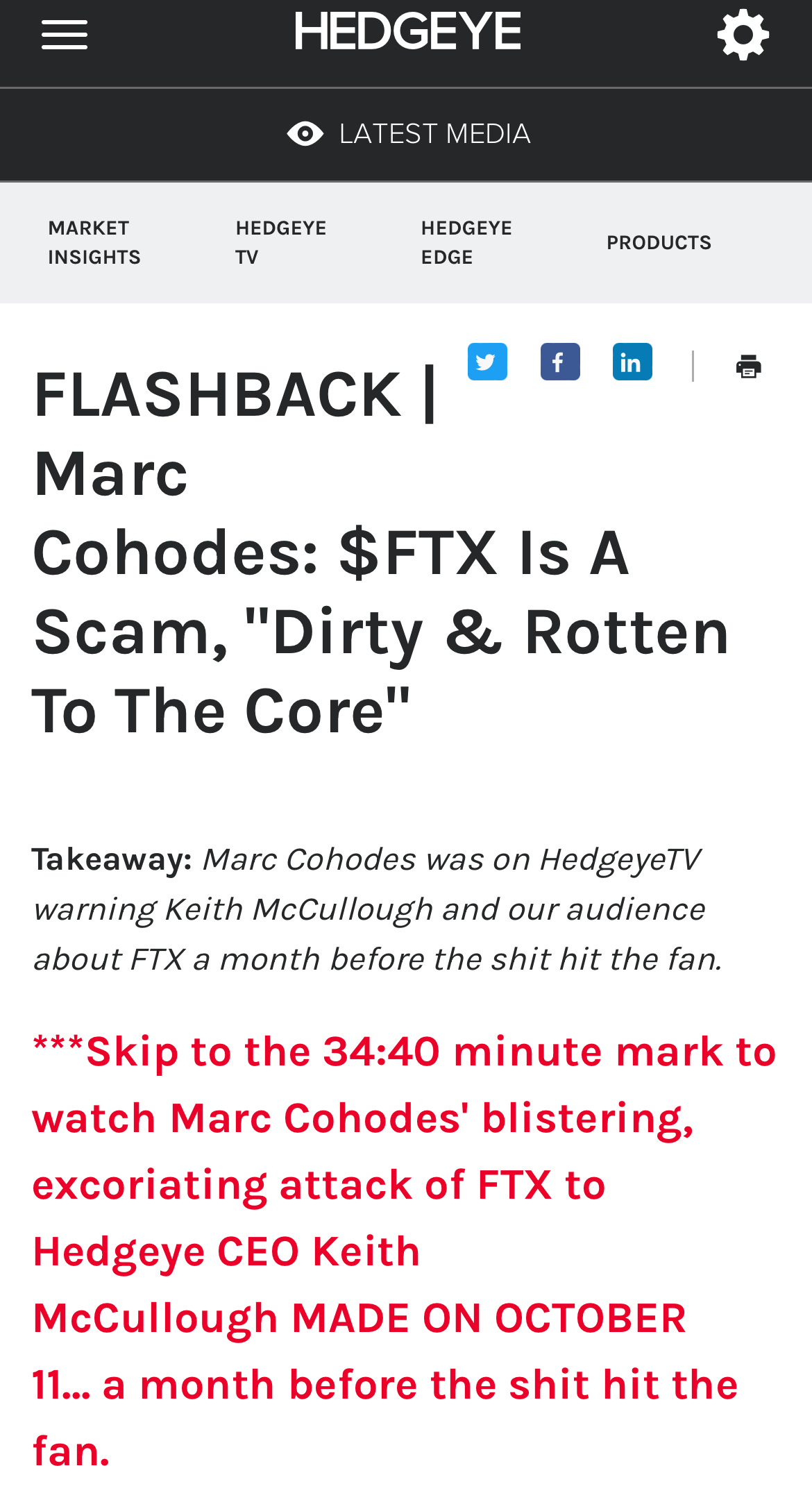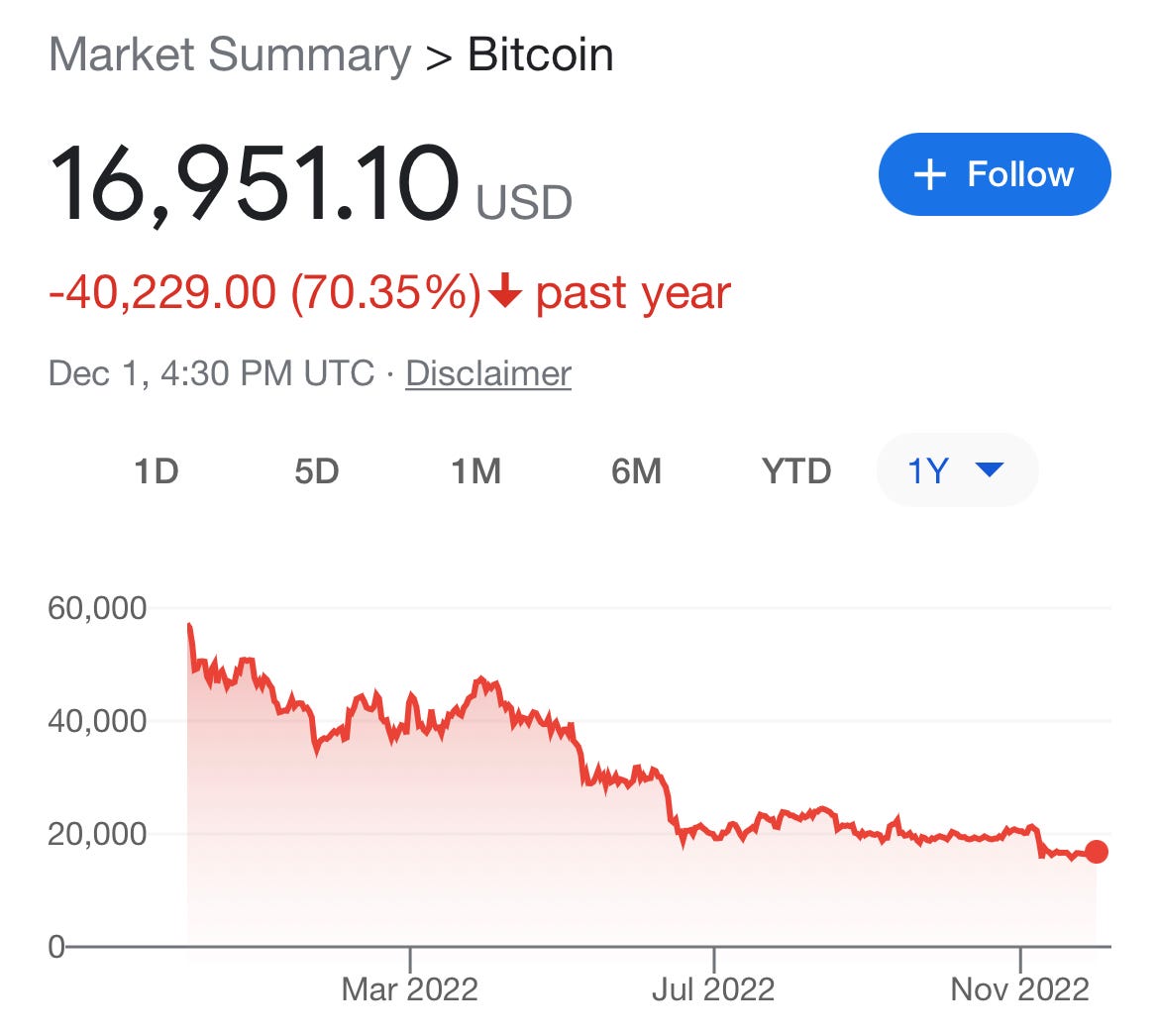An interview with Marc Cohodes, the investor who called the FTX/Sam Bankman-Fried collapse BEFORE it happened
PART 1: How Marc realized FTX was a grift when (almost) no one else did
(FIRST OF TWO PARTS)
One reason last month’s collapse of the cryptocurrency exchange FTX fascinates me is that cryptocurrencies are the financial world’s version of mRNA vaccines.
Both were promoted as new, superior technologies, gifts of the Information Age.
Both made fortunes for a few lucky people, who insisted they were merely serving humanity as they raked in billions.
Both basked in media hype despite obvious red flags.
And both have had… less than perfect results.
—
A few months ago, Sam Bankman-Fried, the founder of FTX, was supposedly worth $26 billion. Today he claims to be down to his last $100,000, likely the fastest loss of this level of wealth anyone has ever had.
Shed no tears for Bankman-Fried. Millions of ordinary people who put money in FTX may have lost as much as $8 billion.
(SBF, as he is known, says he wants to make those investors whole. Yet he remains ensconced in the Bahamas, instead of returning to the United States, where he might face arrest.)
Bankman-Fried fooled almost everyone on his way up.
Sequoia Capital, one of the world’s top venture capital firms, which put $214 million into FTX. The financial media fell for him too. In August, barely three months before FTX collapsed, Fortune magazine ran a glowing cover story of SBF, headlined, “The Next Warren Buffett?”
But independent investor and former hedge fund manager Marc Cohodes wasn’t taken. Cohodes warned about FTX earlier and more loudly than almost anyone else.
20/20 hindsight is easy. Being right when everyone else is wrong isn’t.
—
I’ve been fortunate to know Cohodes for almost 25 years. In 2001, I profiled him for The New York Times.
So I called Cohodes and asked him to explain, ideally in non-technical terms, why he’d been so certain FTX and SBF were bound for doom.
Sure, he said.
Cohodes is, as he would put it, an interesting cat.
He has spent nearly his entire career short-selling. “Long” investors buy companies whose prices they expect to rise. Short-sellers look for companies that are overvalued. They borrow stocks they do not own and sell them, hoping to buy them back later at a lower price.
By its nature, short-selling attracts the contrarian and thick-skinned. Stock markets generally rise over time as the overall economy expands, and most people want to invest in companies that are growing. Short-sellers have both fundamentals and psychology working against them.
But shorts play a crucial role in markets by rooting out deceptive managements and outright frauds. One reason that FTX may have grown so quickly and caused so much harm was that shorting it was essentially impossible, so its hype machine had no opponents.
Almost no opponents.
Cohodes likes a good fight. Sometimes he seems to want one. (My article about him in 2001 began, “Marc Cohodes, the highest-profile short-seller on Wall Street, is getting bored.”)
In 2017, he went at a company called MiMedx so hard that two Federal Bureau of Investigation agents visited him at his house and told him to lay off.
The attempt to intimidate him backfired. Two MiMedx executives were later convinced of fraud and sentenced to a year in prison, and Cohodes remains infuriated about the FBI’s house call.
—
In comparison, FTX was straightforward, Cohodes says. He first became interested in the company in early 2022.
Prices of digital assets like Bitcoin had soared when Covid hit, thanks to the cash infusions that central banks pumped into the financial system to help limit the economic effect of lockdowns.
But as lockdowns finally ended, investors realized that the extra cash had created inflationary pressures. Central banks would have to “pull the punch bowl,” removing money from the system and squeezing financial assets. Prices of Bitcoin and cryptocurrencies began to plunge.
But FTX - whose business should have been hurt as the overall cryptocurrency market collapsed - didn’t behave as Cohodes expected. Instead of retrenching to ensure his company would survive until the market turned sunnier again, Bankman-Fried went on an investment spree.
That move got Cohodes’s attention. And not in a good way.
—
Italics are Cohodes’s own words:
What really got me was when crypto collapsed, you had the bear market of crypto, the crypto winter… All these companies were going under… What tipped me was this guy was throwing money to try to bail these guys out in front of bankruptcy… How stupid could this guy be… [The financial channel CNBC] called him the J.P. Morgan of crypto -
CNBC - which Cohodes calls the Cartoon Network - was referring to Morgan’s famous 1907 effort to stop a bank run and stock market crash by putting his own credit behind weaker banks. But Morgan made sure he knew the banks he backed were solvent. They faced temporary shortfalls because panicked depositors were pulling cash, but their underlying loans were to real companies and solid.
In contrast, Bankman-Fried’s decision to step in to buy junk crypto companies was simply throwing good money after bad, Cohodes said.
Why is he taking real money and bailing these frauds out… What you should do is let them fail and them pick up the pieces… This just didn’t make any sense, it didn’t make any sense -
So Cohodes decided to look at Bankman-Fried and the rest of the FTX executives and management team.
They were glorified interns, they had no experience, they had no exchange experience, they had no capital markets experience… which led me to believe this is a giant fraud…
I figured he was putting money in because there was either collateral damage he was worried about or there was contagion… As it turns out, he [SBF] was worried about these scam tokens they put out.
—
Tokens are digital “coins” that anyone can create. They can be backed by anything. FTX’s tokens, called FTTs, were designed to give their holders a share of FTX’s future revenues, making them a little like shares in FTX, except with fewer rights and protections.
Tokens can be traded for other tokens or sold for “fiat currency” like dollars. FTX’s underlying business was to offer people to buy and sell these tokens as well as use other, more exotic financial instruments to bet on their future value.
In other words, FTX created a “currency,” FTT. Then FTX, which was based in the Bahamas, provided an “exchange” where FTT coins could be traded.
Not surprisingly, this setup gave FTX and Alameda, a hedge fund affiliated with FTX which Bankman-Fried also owned, powerful control over the price of the FTT tokens - at least in the short run.
Tokens for crypto – it’s a completely manipulated market… It’s a completely different world… He paid Tom Brady in these tokens, he gave out these tokens, but the tokens were a completely manipulated market.
FTX’s collapse highlighted the lack of protections for investors in cryptocurrencies, Cohodes says, a problem that runs deeper than a single bad company. American financial regulators are far from perfect, as the banking crisis of 2008 and the technology stock collapse of 2000 prove. But they offer some protection against outright fraud and theft.
You cannot trust any of the shit that’s offshore, I wouldn’t trust any offshore exchange.
But [FTX] was the biggest, the most unorganized, the most leverage… It wasn’t in my mind one thing, it was everything… Enron owned power plants, Sunbeam, which was a fraud, the products worked… Normally the score is 8 to 3 or 8 to 5, it’s not 8 to 0. [With FTX], nothing worked.
[END OF PART 1]






It took one day for Bernie Madoff to be arrested.
Yesterday, Bankman-Fried spoke at the New York Times DealBook conference. He was applauded.
Here's what I don't get. Any situation where a 'normal' person goes bankrupt, the courts start clawing back funds for monies spent in the last however many months are applicable. Some of these damn lawmakers are saying they'll donate that amount to charity. Bullshit, that money should be clawed back from all of them and his crap sold and use that to divide up (for pennies on the dollar) for his customers to get some small bit of money back. This 'donate to charity' crap is a damn joke. This little moron scammed the system in a huge way because he has his hands in politicians pockets. He has to go to federal prison along with all his minions and ugly ass girl friend. Side note, when the money is clawed back, we'll find out exactly how much money went to which politicians. I'm doubting very seriously that he spent as much on both sides as he says. In the long run, that doesn't matter as much as getting every penny they can squeeze out of him, his properties and everyone who was part of this little cabal. Give me a damn break - donate that money to charity? And what about the money invested from Ukraine. So, the US taxpayers put untold sums in Ukraine's hands, they invest with this idiot, he donates to politicians, who vote to give more of our money to Ukraine? Seriously?